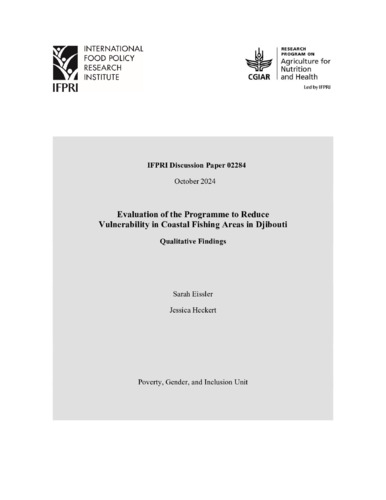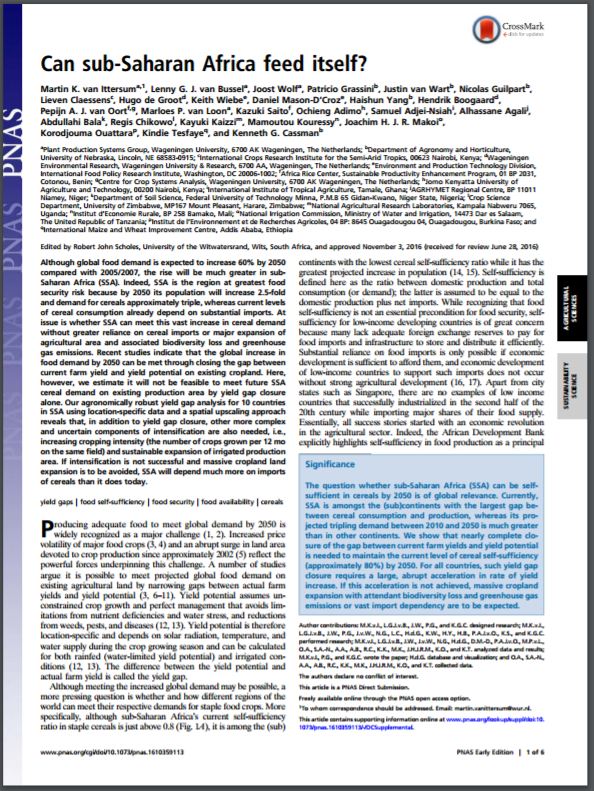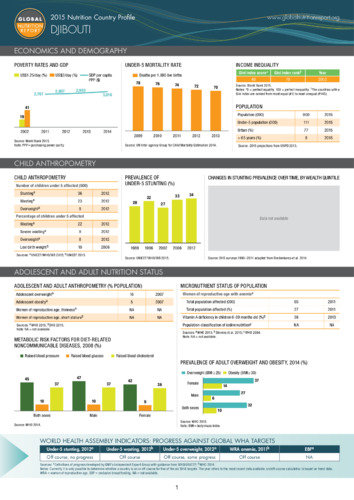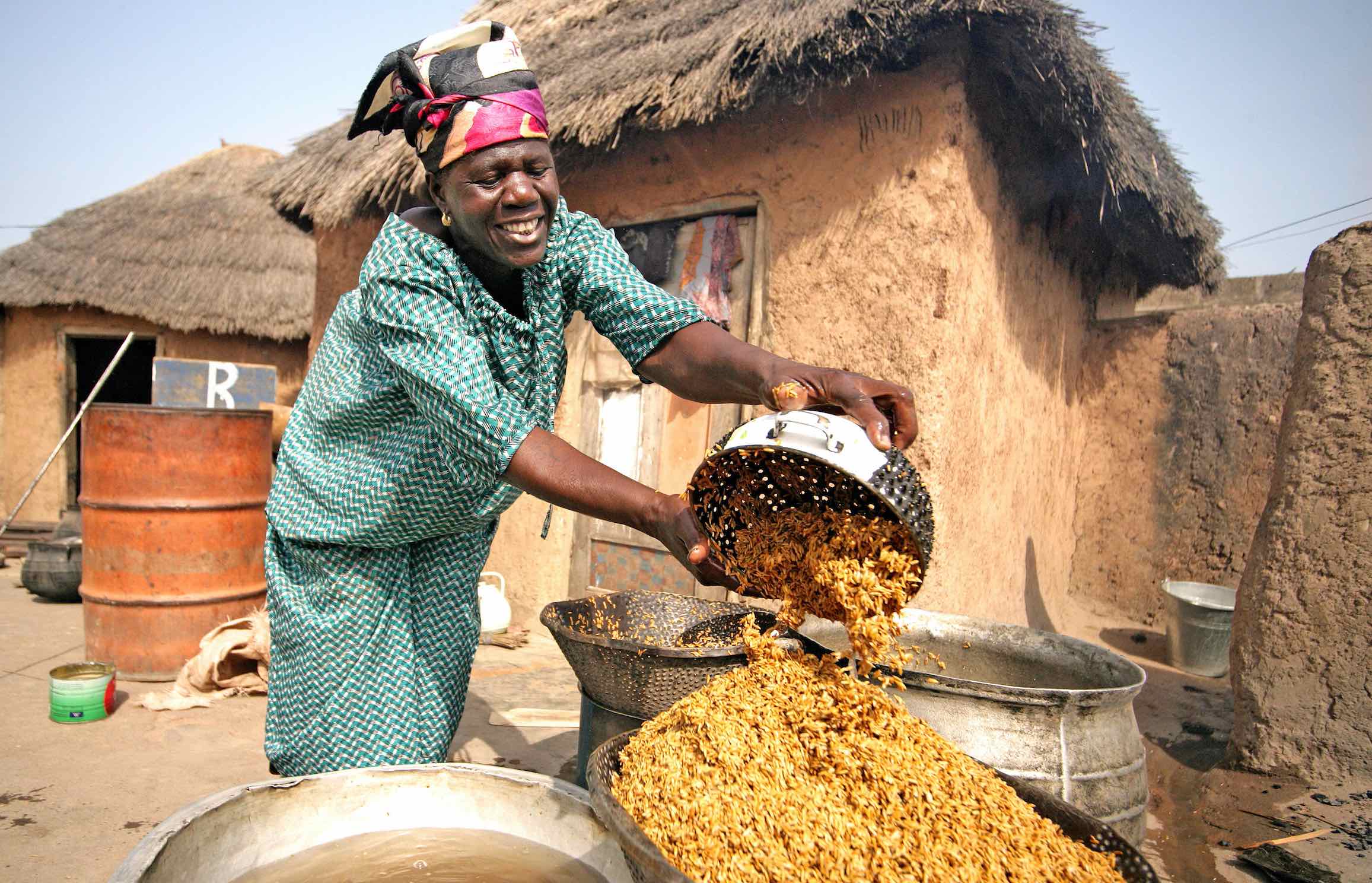Evaluation of the programme to reduce vulnerability in coastal fishing areas in Djibouti: Qualitative findings
We present findings from a qualitative study conducted as part of an impact assessment of the Programme to Reduce Vulnerability in Coastal Fishing Areas (PRAREV) , supported by the International Fund for Agricultural Development (IFAD) and implemented from 2013 to 2021. This study was designed to focus solely on the gender aspects of PRAREV, which overall aimed to support fishing communities and actors in the fishing sector in Djibouti, specifically those living in rural coastal areas affected by climate change, by reducing their vulnerability to the effects of climate change and promote co-management of marine resources. The program targeted those who are poor and who rely on fishing, particularly women involved in fish processing and marketing. The qualitative findings shared in this paper complement findings from an accompanying quantitative study, which found positive effects of the program on incomes, production, women’s influence on decisions, and food security, but not on resilience or nutritional status.
We used multiple qualitative methods, including semi-structured interviews and focus group discussions with program staff and men and women leaders and members of fishing organizations to examine the following research questions focused on the gender component of the program: 1) How the program was delivered from multiple perspectives; 2) How the program strengthened the fishers’ and fishmonger associations; and 3) The benefits and costs of the program in the areas of climate change resilience, livelihoods, and changes in the fishing sector.
While PRAREV aimed to take a gender-sensitive approach, the gender strategy and its delivery could have been improved. PRAREV mainly reached women by intentionally including women fishing organizations so that they could benefit from access to collective resources, training, and knowledge. PRAREV trainings often were not communicated to women members of fishing organizations, which led to women’s relative exclusion compared to men members.
However, participants shared both positive and negative feedback on the PRAREV program. They generally agreed that when delivered, the trainings were well received and increased knowledge and awareness of climate change and knowledge of upgrading techniques in the fishing sector. The climate change trainings developed awareness about the drivers of climate change and taught best practices on the preservation of local marine resources. However, these trainings did not address adaptation to depleted fish populations in mangroves or reefs. Other trainings focused on value chain upgrading were well received and when delivered, increased relevant knowledge. However, their reach was limited, particularly among women fishing organization members.
Finally, PRAREV provided organizations key resources for value chain upgrading and integration in the fishing sector in a way that preserved the local marine environment (e.g., boats, knives, fishing wires, nets). While fishing organization members spoke positively of these resources, there were challenges in delivering them. They were delivered late in the project, often without training or a sustainability plan, or were often not delivered as promised, creating frustration and tension among group members. They were also often delivered in smaller quantities than originally communicated and as such, the recipient fishing organizations limited their use. Overall, group members felt there was limited transparency in delivering these resources.
Based on these findings, we share recommendations for PRAREV and similar programs. We suggest conducting formative research on the local fishing sector to identify how men and women want to participate and the key barriers they face in doing so. With respect to resource provision, programs should provide resources earlier and should deliver them with a sustainability plan that has community buy in. Implementers should aim to understand how groups could make use of high-value common property to enable transparency and sustainability. Trainings should also be tailored to the local context and be more in-depth. Importantly, program staff should ensure that all intended beneficiaries, especially women, are invited and able to participate in program trainings so that all members can benefit from the knowledge, awareness, and skill building gained at each training event. Programs should implement a more robust monitoring plan to ensure resources are adequately used and equitably distributed, and that all intended beneficiary groups benefit equitably. Finally, although PRAREV was designed to undertake a gender-sensitive approach, further refinement of this approach could likely improve program delivery and impact. A gender accommodative approach would have supported and empowered women from within the traditional gender roles that they feel more comfortable with to participate and upgrade in their respective fishing activities.
Authors
Eissler, Sarah; Heckert, Jessica
Citation
Eissler, Sarah; and Heckert, Jessica. 2024. Evaluation of the programme to reduce vulnerability in coastal fishing areas in Djibouti: Qualitative findings. IFPRI Discussion Paper 2284. Washington, DC: International Food Policy Research Institute. https://hdl.handle.net/10568/155277
Keywords
Africa; Eastern Africa; Fishing; Gender; Vulnerability; Women’s Empowerment
Access/Licence
Open Access
Project
Agriculture for Nutrition and Health








